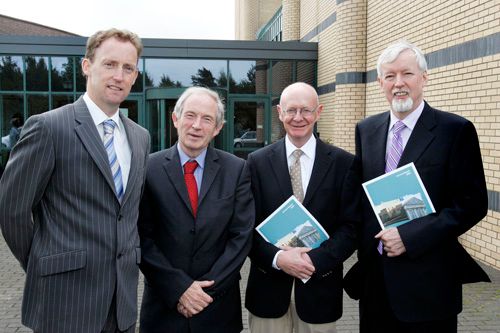End of Year Results from Ireland’s first comprehensive Bowel Cancer Screening Programme announced
Posted on: 29 July 2009
Screening Programme Detects 50 colon cancers in Tallaght Area alone
Results from the first comprehensive Bowel Cancer Screening Programme in the country were launched on July 27th last in the Adelaide and Meath Hospital, Dublin Incorporating the National Children’s Hospital, Tallaght (AMNCH). The results highlight that 50 people tested positive for Advanced Neoplasia or cancer.
Speaking at the launch of the annual report, Professor Colm O’Morain, Dean of Health Sciences at Trinity College Dublin and consultant gastroenterologist at AMNCH explained: “We are delighted with the results of the initial phase of this screening programme which was limited to a population in the Tallaght area. The overwhelming positive pickup rate of colonic polyps and colorectal carcinoma in the AMNCH – Trinity College Bowel Cancer Screening Programme demonstrates the potential benefits of bowel screening programmes. The results and the expertise gained from this programme have the potential to inform developments of any future national screening programme”.

Barry Andrews, TD; Professor Colm O’Morain, Dean of Health Sciences at TCD & consultant gastroenterologist at AMNCH; Professor Ian Graham, Vice Chair of the Hospital Board & consultant cardiologist at AMNCH; Dr John Hegarty, Provost of TCD.
To date, the screening programme has issued 4049 test kits to participants from information received from the general practitioners in the Tallaght area. The target population for the first stage of screening was 10,000 and included persons aged 50-74 years. The programme has funding to run for one more year.
Professor O’ Morain explained at the launch: “Recent reports by NCSS and HIQA have outlined that the provision of a dedicated bowel screening programme at a national level would reduce bowel cancer diagnosis by 36%. Our programme demonstrates that the cost-effectiveness of a national programme for bowel screening. The cost could be further substantially reduced by using current existing resources, both equipment and personnel, in hospital settings. The colonoscopies on this study were done out-of-hours on Saturdays using existing facilities in Tallaght Hospital”.
Speaking at the launch, the Provost of Trinity College Dublin, Dr John Hegarty commented: “Today’s research, is tomorrow’s practice. The spin-off from this programme will lead to the development of new biomarkers and new technologies that will have the capacity of detecting early cancer, thereby making a significant contribution to improved patient healthcare in Ireland’s hospitals.”
Professor O’ Morain outlined that the programme would not have been possible without the support of the Health Information and Quality Authority (HIQA), who contributed a grant towards the major costs involved. He also expressed thanks to the Meath Foundation, Olympus Keymed Ireland, Norgine Pharma, Ireland and Health Express Pharmacy, Tallaght, Ireland all of whom contributed additional funding.
Mr Kelly was one of the participants in the screening programme who discovered he had bowel cancer. He explains, “When the letter of invitation to participate in the programme came through the post myself and my wife decided to participate. We used the kits provided, which were very easy to use, and we returned the samples. We never thought for a moment that they would show anything. When my sample came back positive the team invited me in to have a colonoscopy. The results of that test showed that I had cancer. I was operated on one week later. Now I’m on the road to recovery and I’m very grateful. I had no idea I was ill and if I hadn’t participated in the programme my cancer might not have been detected until it was too late and I might not have been around to watch my lovely granddaughter grow up. My grandchild was born while I was recovering and she gave me strength on my road to recovery.”
Colorectal Cancer (CRC) is the most commonly diagnosed malignancy and the second largest cause of cancer-related death in Europe. It is the third most common cancer in Ireland. Approximately 1 in 24 people in Ireland will develop bowel cancer during their lifetime and more than 900 people die from colorectal cancer each year.
The Research team involved in the bowel screening programme comprised: Professor Colm O’Morain, Lead Clinician/Gastroenterologist, AMNCH, Professor of Medicine, Dean of Health Science, Tallaght/Trinity College Dublin Trinity – Cillin Condon, Project Coordinator, Trinity College Dublin – Nikki Lee, Colorectal Cancer Screening Nurse Coordinator, Trinity College Dublin – Dr David Hughes, Research Fellow, Trinity College Dublin – Dr Leanne Kelley, Medical Scientist, AMNCH, Tallaght, Dublin – Paul Walsh, Medical Scientist, AMNCH, Tallaght, Dublin – Dr Mary Shuhaibar, Clinical Lecturer, Trinity College Dublin – Mr Paul Neary, Consultant Surgeon, AMNCH, Tallaght, Dublin – Paudy O’Gorman, Manager in Care, AMNCH, Tallaght, Dublin – Dr Gerard Boran, Consultant Clinical Biochemistry, AMNCH, Tallaght, Dublin – Dr Niall Swan, Pathologist, AMNCH, Tallaght, Dublin – Dr Asghar Qasim, Co-Lead Clinician/Gastroenterologist, AMNCH, Tallaght/Trinity College Dublin
Notes to Editor:
The FIBT test is a simple test and participants carried out the test using a kit in their own homes and returned a sample to the hospital for analysis. The test detects tiny amounts of blood, often released from bowel cancers or polyps into the bowel motion (faeces). To increase the chances of detecting tiny amounts of blood in the bowel motion, participants provided samples from two separate bowel motions. Because the test involves taking separate samples, it is not practical to do the test at a doctor’s surgery.
